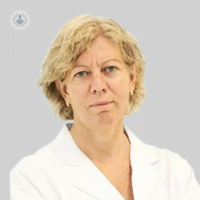Cáncer de pulmón: importancia del diagnóstico precoz
Written by:Lung cancer arises from the growth of malignant cells in the respiratory system and, in

Concrete, in the lung tissue. It is the most frequent cancers worldwide, partly due to smoking. Early diagnosis will positively influence the treatment and cure rate of the disease.
Importance of early detection of lung cancer
Lung cancer does not usually cause symptoms that are easy to identify in the early stages, making it difficult to detect them at these stages, among other reasons because there is no screening test, as is the case with breast cancer.
However, there are certain symptoms that alert the appearance of lung cancer and that deserve to go to the doctor's office, for a detection as early as possible:
- Persistent cough for more than ten days, with no apparent cause, or worsening of a chronic cough
- Blood in the sputum for several days
- Persistent bronchitis - recurrent respiratory infections
- difficulty breathing
- Chest pain
- Loss of weight or tiredness for no apparent reason
Although lung cancer can affect anyone, caution should be exercised in people who have smoked for years, even if they have stopped smoking, or have been passive smokers, as smoking is the major risk factor for Lung cancer
How to diagnose lung cancer
The diagnosis of lung cancer should be started with a chest x-ray , in order to verify the origin of the symptoms. If the radiograph confirms the presence of abnormal cells in the lung, additional imaging tests such as Computed Tomography (CT) will be performed to obtain more information about these cells.
To confirm the diagnosis, however, a biopsy must be performed and analyzed in the laboratory to verify if the cells are cancerous or not and, if so, to determine the type of cancer. The detailed analysis of the cells is essential for an accurate diagnosis, since there are multiple lung cancers. In this sense, there are genetic analyzes that determine the molecular characteristics of each tumor and prescribe the most appropriate treatment.
If the diagnosis of cancer is confirmed, a new imaging test called positron tomography or PET will be performed to determine if the tumor is located at its point of origin or has spread to other tissues or organs. A complete blood test that includes tumor markers will also be needed.
The rapid diagnostic circuit allows to reduce the term to a week between the first consultation of a newly diagnosed patient or with suspected lung cancer, and the start of treatment.
Treatment of lung cancer
The treatment of lung cancer should be done individually, according to the characteristics of the tumor and the degree of extension at the time of diagnosis. Hence, the individualization of treatment is the key to achieving maximum therapeutic efficacy. In this sense, the objective of the treatment will be curative (completely eliminate the tumor) or palliative (prolong the life of the patient and reduce the suffering).
In cases where the cancer is limited to the place of origin, a surgical intervention will be performed to remove the tumor in its entirety. Subsequently a treatment with chemotherapy and / or radiotherapy will be given to remove tumor cells that may have been left after surgery. The patient will also be followed up, especially during the first 3 years, consisting of complete blood tests with tumor markers every three months and imaging tests every six months.
In cases where cancer has spread and surgery does not allow the removal of tumor cells, treatment is usually based on chemotherapy and radiation therapy. Many patients can also benefit from new drugs that selectively attack tumors or others, depending on their molecular characteristics.
Lung Cancer Unit
The lung cancer unit serves patients with suspected lung cancer who require diagnosis as well as patients already diagnosed but coming for treatment. Also to obtain second medical opinions and reorient the individualized treatment according to the type of lung cancer in question, the degree of extension and the genetic and molecular characteristics of the malignant cells.
To obtain the best personalized treatment, it is important that the lung cancer unit be made up of a multidisciplinary team of medical oncologists , pulmonologists, radiotherapists, surgeons, pathologists and nurses. Psychological or psychiatric care is also essential for patients who need it, nutrition counseling and complementary medicine for the treatment of anxiety and pain.
This equipment will make it easier for patients to receive and perform all the tests and treatment in the same place and in the minimum possible time.


